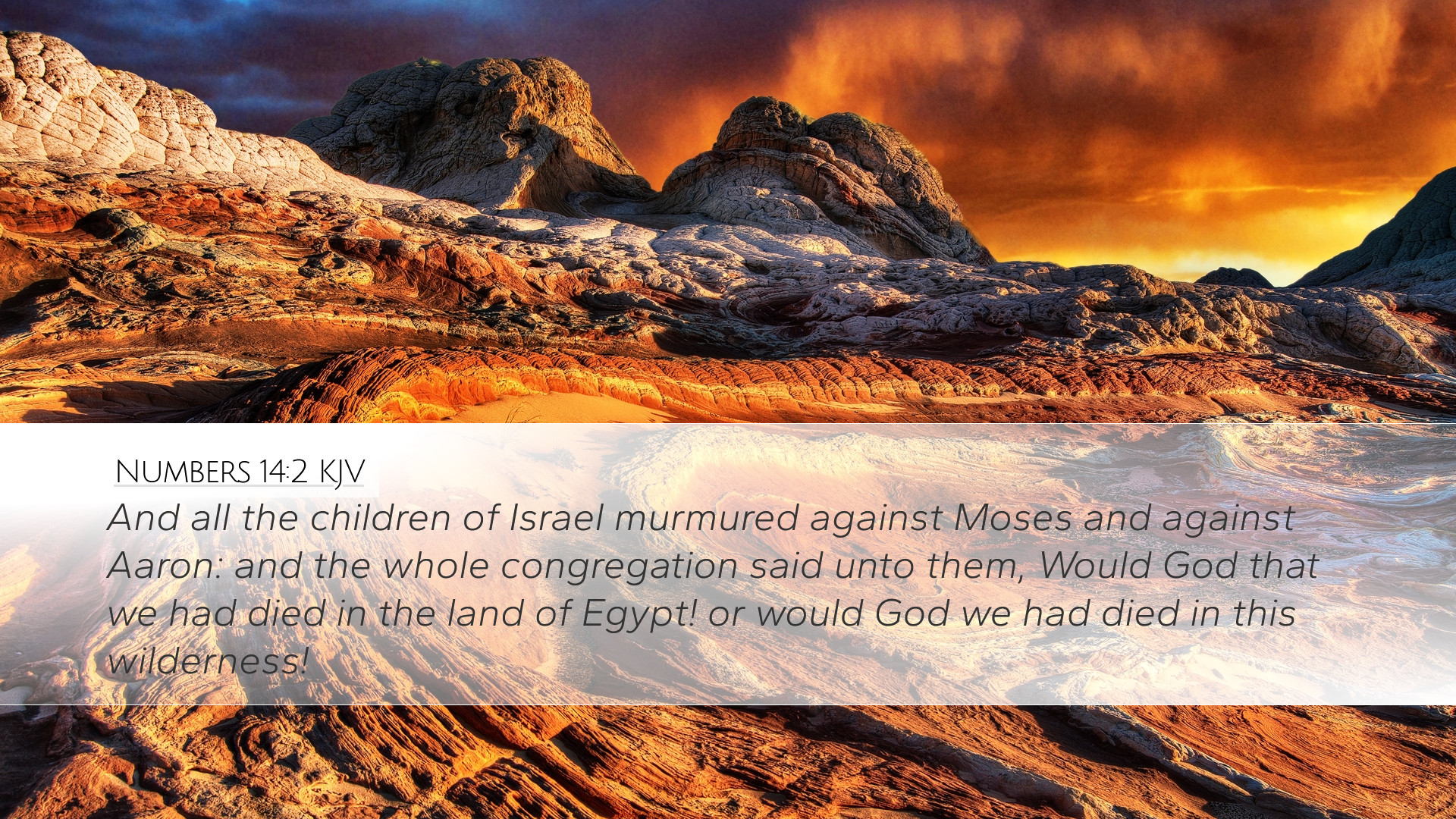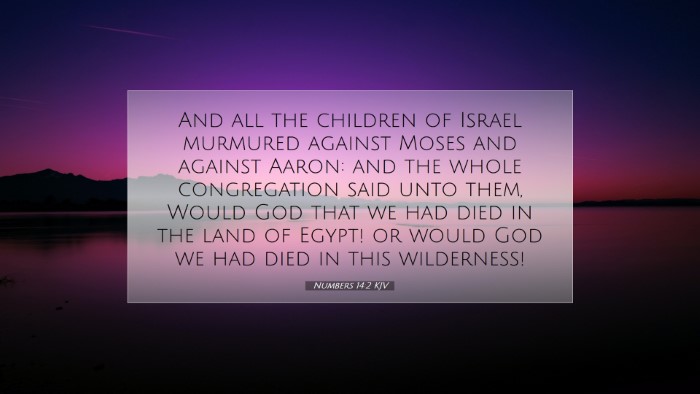Commentary on Numbers 14:2
Numbers 14:2 states, "And all the children of Israel murmured against Moses and against Aaron: and the whole congregation said unto them, Would God that we had died in the land of Egypt! or would God we had died in this wilderness!"
Context and Overview
This chapter occurs at a crucial moment in Israel's journey, immediately following the report of the twelve spies who scouted the land of Canaan. The reaction of the Israelites to the spies' negative report illustrates a deep-seated fear and disbelief amid God's promise of deliverance.
Several public domain commentaries offer rich insights into the implications of this verse:
Insights from Matthew Henry
Matthew Henry notes that the murmuring of the Israelites reflects a grave lack of faith. Their nostalgia for Egypt showcases a misplaced yearning, forgetting the harshness of their bondage. Henry emphasizes the danger of collective discontent, stating that the entire congregation's grumbling against their leaders bespeaks a broader spiritual crisis. This lamentation in their hearts reveals a rejection of God’s providence and promises, essentially arguing against His faithfulness.
He comments on the absurdity of the Israelites wishing for death over faithful obedience, indicating a complete failure to appreciate God’s delivering power. The wish to die in the wilderness is symbolic of despair, devoid of hope for the future. Henry aptly points out that they were tormenting themselves with negative thoughts that stemmed from their fears rather than standing firm on God's assurances.
Insights from Albert Barnes
Albert Barnes provides a theological reflection on the faithlessness displayed by the children of Israel. He underscores that their outcry is rooted in an acute lack of trust in God, who had up to this moment delivered them from Egypt and provided for their needs in the wilderness. Barnes elucidates that the murmuring against Moses and Aaron is tantamount to a rebellion against God Himself, as He appointed these leaders.
Barnes highlights the significance of leadership in spiritual journeys, noting that when a congregation turns against its leaders, it often signifies deeper issues of distrust in God’s overarching plan. He also points to the irony in their desire to return to Egypt, as they are essentially desiring to return to slavery rather than face the challenges of faith that require courage and perseverance.
Insights from Adam Clarke
Adam Clarke provides a philosophical interpretation, observing that the emotional response of the Israelites is not just a reaction to their circumstances but a reflection of human nature struggling with fear and uncertainty. Clarke argues that the collective voice of the congregation reveals the power of despair and disbelief in swaying the will of the people, illustrating how quickly one can abandon faith when faced with difficulty.
Clarke also explores the concept of “murmuring,” explaining it as a grave sin against God, stemming from ingratitude and a lack of recognition for divine intervention. He warns against the danger of such an attitude, as it can lead to a cycle of rebellion and judgment. Clarke suggests that personal faith must be cultivated, acknowledging that reliance on collective opinion can often lead to devastating turns, steering the faithful away from God’s promises.
Theological Implications
The murmuring of the Israelites against Moses and Aaron serves as a poignant reminder for current believers of the dangers of discontentment and lack of faith. The theologians emphasize that, just as the Israelites demonstrated a profound distrust in God during a period of testing, contemporary believers may also find themselves wavering under pressure.
In contemplating this verse, the following themes emerge:
- The Nature of Faith: Genuine faith requires trusting in God's plan even when circumstances seem dire.
- The Power of Leadership: Pastors and spiritual leaders are often the targets of dissatisfaction; thus, it is crucial for congregations to uphold their leaders in prayer.
- Consequences of Distrust: The Israelites' desire to return to Egypt underscores the tendency of believers to romanticize past suffering when faced with current challenges.
Application for Modern Believers
For pastors, students, and theologians, it is important to recognize that the lessons from Numbers 14:2 extend beyond mere historical reflection. They serve as foundational teachings on faith, obedience, and the critical role of community in spiritual journeys. The following applications can be drawn:
- Embrace Faithfulness: When challenges arise, remember to lean on God’s promises and engage in prayerful discernment rather than succumb to despair.
- Cultivate Gratitude: Reflect on past deliverances and testimonies of God’s faithfulness to maintain a heart of gratitude amidst trials.
- Support Leadership: Actively encourage and uplift spiritual leaders within the church, recognizing the burden they carry.
Conclusion
Numbers 14:2 captures a critical moment in Israel's history—a moment that resonates deeply with believers today. Through the insights of esteemed commentators, we see the timeless truths of faith, leadership, and the struggles faced by God's people. As we reflect on this passage, may we heed the lessons of the past and strive to cultivate unwavering faith in the present.


